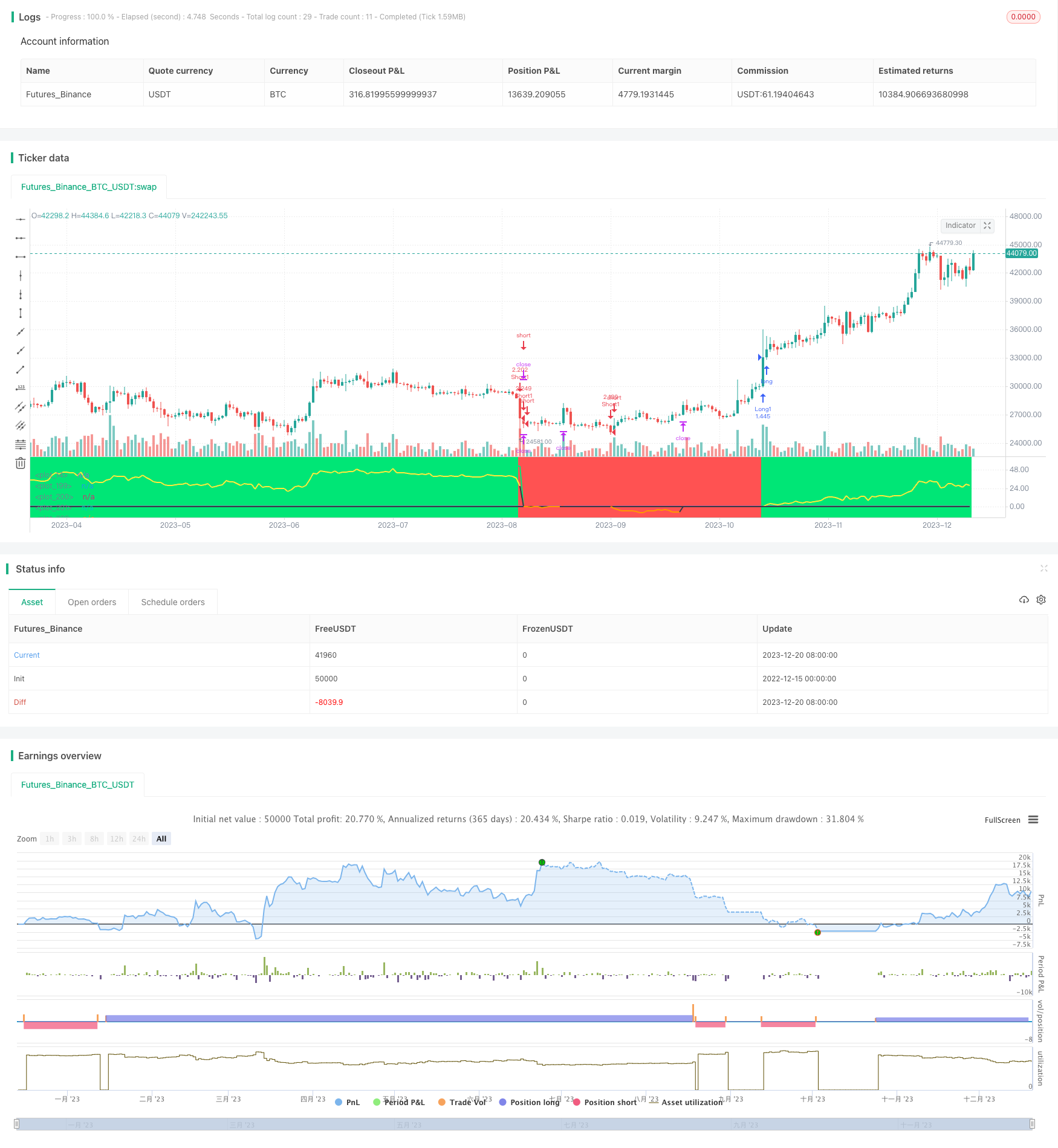Estratégia de negociação de futuros XBT com base no sentimento

Visão geral
Esta estratégia utiliza o método de análise de emoções de vários períodos para fazer negociações de longo prazo em contratos de XBTUSD. Ela considera integralmente a amplitude de flutuação dos preços em diferentes períodos e as informações de preços mais altos e mais baixos, e calcula o valor de emoção geral do mercado atual através de uma série de ajustamentos de peso.
Princípio da estratégia
Calcule os indicadores de preço máximo, preço mínimo, preço médio e amplitude de flutuação de preços para cada ciclo a a j (linhas K de 1 a 89)
Definir a posição padronizada do preço de fechamento atual dentro do intervalo de preços (variabilidade de lugar), e combinar a amplitude de flutuação de preços em cada período para calcular o valor emocional em diferentes períodos.
O valor da emoção é ajustado por uma série de pesos (w) para calcular o valor da emoção geral (sentiment). O valor da emoção reflete a emoção média do mercado atual.
Analisar oscilações de valores emocionais, gerando um sinal de venda quando a emoção passa de positiva para negativa; quando a emoção passa de negativa para positiva, gerando um sinal de compra.
O tamanho do valor absoluto de flutuação do sentimento (variabilidade delta), a intensidade de entrada e a configuração de condições de stop loss.
Vantagens estratégicas
A análise de tendências de mercado leva em conta sentimentos em diferentes períodos de tempo.
O mecanismo de ajuste de peso torna a estratégia mais estável.
A análise do valor emocional e da volatilidade emocional permite uma avaliação mais precisa do momento da entrada.
Combinação de preços mais baixos com preços mais altos e controle de risco de um mecanismo de stop-loss.
Risco estratégico
A configuração inadequada dos parâmetros pode levar a negociações excessivamente frequentes ou a oportunidades perdidas.
A estratégia pode falhar se ocorrer um acidente repentino de cisne negro.
Alterações nos contratos, mudanças nas regras de negociação, etc. podem afetar a estratégia.
O cálculo do valor emocional depende de dados históricos, que precisam ser reavaliados e ajustados quando a estrutura do mercado muda.
Pode ser otimizado por meio do ajuste de parâmetros como ponderação, ciclo de negociação e amplitude de stop loss, para que a estratégia se adapte melhor às mudanças na estrutura do mercado. Ao mesmo tempo, otimize a gestão de fundos, controle rigoroso do tamanho de cada transação e posição geral.
Direção de otimização
Continuar a expandir o ciclo de análise para enriquecer a base do julgamento emocional.
Adicionar mais indicadores técnicos para combinar o julgamento emocional com os indicadores técnicos.
A partir daí, a tecnologia de aprendizagem de máquina é usada para extrair características emocionais.
Ajuste dinâmico de pesos.
Otimização da estratégia de stop loss.
Resumir
Esta estratégia baseia-se na filosofia de negociação da análise da emoção, através de considerações integradas de vários períodos, para julgar a emoção do mercado atual como um todo. Sua mudança contínua de emoção serve de base para a geração de sinais de negociação, e é auxiliada pela informação sobre a oscilação de preços para determinar o momento específico de entrada.
/*backtest
start: 2022-12-15 00:00:00
end: 2023-12-21 00:00:00
period: 1d
basePeriod: 1h
exchanges: [{"eid":"Futures_Binance","currency":"BTC_USDT"}]
*/
// This source code is subject to the terms of the Mozilla Public License 2.0 at https://mozilla.org/MPL/2.0/
// © Jomy
//@version=4
//2h chart BITMEX:XBTUSD
//use on low leverage 1-2x only
strategy("expected range STRATEGY",overlay=false,initial_capital=1000,precision=2)
leverage=input(1,"leverage",step=.5)
tp=input(53,"take profit %",step=1)
sl=input(7,"stoploss %",step=1)
stoploss=1-(sl/100)
plot(stoploss)
level=input(.70,"level to initiate trade",step=.02)
closelevel=input(0.0,"level to close trade",step=.02)
levelshort=input(.68,"level to initiate trade",step=.02)
closelevelshort=input(0.0,"level to close trade",step=.02)
wa=input(1.158,"weight a",step=.2)
wb=input(1.119,"weight b",step=.2)
wc=input(1.153,"weight c",step=.2)
wd=input(1.272,"weight d",step=.2)
we=input(1.295,"weight e",step=.2)
wf=input(1.523,"weight f",step=.2)
wg=input(1.588,"weight g",step=.2)
wh=input(2.100,"weight h",step=.2)
wi=input(1.816,"weight i",step=.2)
wj=input(2.832,"weight j",step=.2)
a=1
b=2
c=3
d=5
e=8
f=13
g=21
h=34
i=55
j=89
n=0
n:=if volume > -1
nz(n[1])+1
ra=highest(high,a)-lowest(low,a)
aa=sma(ohlc4,a)
ha=aa[1]+ra[1]/2
la=aa[1]-ra[1]/2
rb=highest(high,b)-lowest(low,b)
ab=sma(ohlc4,b)
hb=ab[1]+rb[1]/2
lb=ab[1]-rb[1]/2
rc=highest(high,c)-lowest(low,c)
ac=sma(ohlc4,c)
hc=ac[1]+rc[1]/2
lc=ac[1]-rc[1]/2
rd=highest(high,d)-lowest(low,d)
ad=sma(ohlc4,d)
hd=ad[1]+rd[1]/2
ld=ad[1]-rd[1]/2
re=highest(high,e)-lowest(low,e)
ae=sma(ohlc4,e)
he=ae[1]+re[1]/2
le=ae[1]-re[1]/2
rf=highest(high,f)-lowest(low,f)
af=sma(ohlc4,f)
hf=af[1]+rf[1]/2
lf=af[1]-rf[1]/2
rg=highest(high,g)-lowest(low,g)
ag=sma(ohlc4,g)
hg=ag[1]+rg[1]/2
lg=ag[1]-rg[1]/2
rh=highest(high,h)-lowest(low,h)
ah=sma(ohlc4,h)
hh=ah[1]+rh[1]/2
lh=ah[1]-rh[1]/2
ri=highest(high,i)-lowest(low,i)
ai=sma(ohlc4,i)
hi=ai[1]+ri[1]/2
li=ai[1]-ri[1]/2
rj=highest(high,j)-lowest(low,j)
aj=sma(ohlc4,j)
hj=aj[1]+rj[1]/2
lj=aj[1]-rj[1]/2
placea=((close-la)/(ha-la)-.5)*-100
placeb=((close-lb)/(hb-lb)-.5)*-100
placec=((close-lc)/(hc-lc)-.5)*-100
placed=((close-ld)/(hd-ld)-.5)*-100
placee=((close-le)/(he-le)-.5)*-100
placef=((close-lf)/(hf-lf)-.5)*-100
placeg=((close-lg)/(hg-lg)-.5)*-100
placeh=((close-lh)/(hh-lh)-.5)*-100
placei=((close-li)/(hi-li)-.5)*-100
placej=((close-lj)/(hj-lj)-.5)*-100
sentiment=((placea/j)*ra*wa+(placeb/i)*rb*wb+(placec/h)*rc*wc+(placed/g)*rd*wd+(placee/f)*re*we+(placef/e)*rf*wf+(placeg/d)*rg*wg+(placeh/c)*rh*wh+(placei/b)*ri*wi+(placej/a)*rj*wj)/(wa+wb+wc+wd+we+wf+wg+wh+wi+wj)
deltalong=0.0
deltalong:=if sentiment>0
nz(deltalong[1])+sentiment-sentiment[1]
else
0
deltashort=0.0
deltashort:=if sentiment<0
nz(deltashort[1])+((sentiment-sentiment[1])*-1)
else
0
//plot(sentiment*-1,color=color.blue)
//plot(deltalong,color=color.red)
//plot(deltashort,color=color.lime)
peakfindlong=highest(deltalong,j)*level
peakfindshort=highest(deltashort,j)*levelshort
contracts=(strategy.equity/close)*leverage
//reason for o is this strategy makes dumb trades before the sentiment line crosses the 0 point the first time
o=0
o:=if cross(0,sentiment) and n>j
1
else
nz(o[1])
long=deltashort>peakfindlong and o==1
short=deltalong>peakfindshort and o==1
longstart=0.0
longstart:=if strategy.position_size>0 and strategy.position_size[1]<=0
close
else
nz(longstart[1])
shortstart=0.0
shortstart:=if strategy.position_size<0 and strategy.position_size[1]>=0
close
else
nz(shortstart[1])
highsincelong = 0.0
highsincelong := if strategy.position_size>0
max(max(highsincelong[1],high),high[1])
else
0
lowsinceshort = 1000000.0
lowsinceshort := if strategy.position_size<0
min(min(lowsinceshort[1],low),low[1])
else
10000000
closelong=strategy.position_size > 0 and ((highsincelong/longstart-1)*100) > tp
closeshort=strategy.position_size < 0 and ((shortstart/lowsinceshort-1)*100) > tp
stoptrade=0
stoptrade:= if closelong
1
else
nz(stoptrade[1])
stoptrade:= if short and stoptrade[1]==1
0
else
stoptrade
stoptrade:= if closeshort
-1
else
stoptrade
stoptrade:= if long and stoptrade[1]==-1
0
else
stoptrade
if(closelong)
strategy.close("Long1")
pnllong = ((close - strategy.position_avg_price) / strategy.position_avg_price)*100
pnlshort = ((strategy.position_avg_price-close) / strategy.position_avg_price) *100
plot (strategy.position_size > 0 ?(highsincelong/longstart-1)*100 : 0.0,color=color.lime,linewidth=2)
plot (strategy.position_size < 0 ?(shortstart/lowsinceshort-1)*100 : 0.0,color=color.red,linewidth=2)
plot( strategy.position_size > 0 ? pnllong:0, color=strategy.position_size > 0 ?color.yellow:color.black,linewidth=2 )
plot( strategy.position_size < 0 ? pnlshort:0, color=strategy.position_size < 0 ?color.orange:color.black,linewidth=2)
longuntilshort=0
longuntilshort:=if long
1
else
if short
-1
else
nz(longuntilshort[1])
bgcolor(stoptrade!=0?color.black:longuntilshort==1?color.lime:longuntilshort==-1?color.red:na,transp=70)
if(long and stoptrade==0)
strategy.entry("Long1",strategy.long,qty=max(1,min(contracts,1000000000)))
if(closelong)
strategy.close("Long1")
strategy.exit("Long1",stop=longstart * stoploss,when = strategy.position_size>0)
if(short and stoptrade==0)
strategy.entry("Short1",strategy.short,max(1,min(contracts,1000000000)))
if(closeshort)
strategy.close("Short1")
strategy.exit("Long1",stop=shortstart / stoploss,when = strategy.position_size<0)